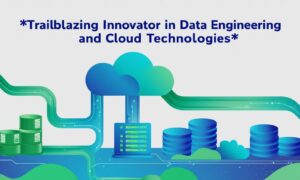Cloud technologies drive digital transformation, creating immense opportunities for IT professionals. In a recent publication, Rohini Isarapu and co-author Sharathchandra Gowda delve into strategies for seamless career transitions into cloud computing. Their insights offer a valuable roadmap for excelling in this dynamic and fast-evolving domain.
The Soaring Demand for Cloud Expertise
The global adoption of cloud technologies has reshaped industries, creating a high demand for skilled professionals in roles like cloud architects, developers, and security specialists. The market for cloud computing, valued at $442.89 billion in 2022, is projected to grow to an astonishing $2.75 trillion by 2032, with a compound annual growth rate of 20.10%. This transformation, driven by enterprise digitalization and hybrid-cloud strategies, has created a significant skills gap. For IT professionals, mastering cloud computing has become a strategic move toward career advancement and job security.
Cloud-related roles are some of the most lucrative in the IT sector. For example, cloud architects and DevOps engineers command salaries ranging from $105,000 to $210,000 annually. These numbers highlight the premium organizations place on professionals who can navigate cloud environments effectively. As organizations increasingly adopt multi-cloud strategies—85% of enterprises currently employ them—being proficient in these technologies is no longer optional but essential.
Mastering the Foundations of Cloud Technologies
Transitioning into cloud computing demands a strong grasp of fundamental skills, including networking, virtualization, and Linux administration. These areas form the backbone of cloud infrastructure, with research indicating that 75% of cloud roles require advanced networking expertise and 92% of containerized workloads rely on Linux systems. Also, programming proficiency in Python, Java, Go, and JavaScript is crucial. These languages enable automation, infrastructure management, and the development of cloud-native applications, empowering professionals to effectively manage, secure, and optimize cloud environments while driving innovation in enterprise systems.
Innovative Learning Pathways for IT Professionals
The journey to becoming a cloud professional combines theoretical learning with hands-on practice. Free-tier cloud services and sandbox environments allow learners to experiment with real-world scenarios, and research shows that project-based learning improves retention by 76%. Certifications, from entry-level AWS Cloud Practitioner to advanced Professional Cloud Architect, enhance employability and technical skills. Structured learning paths blending practice and certification help professionals achieve career goals and excel in technical evaluations.
Adapting to Advanced Cloud Technologies
The evolution of cloud-native architectures, including containerization, serverless computing, and microservices, has transformed application development. Enterprises that adopt these technologies report significant gains, such as a 53% reduction in time-to-market for new features. Professionals who specialize in these modern architectures are highly sought after, as they help organizations optimize performance and scalability.
Infrastructure as Code (IaC) has further revolutionized cloud operations, enabling automation and reducing deployment times. Professionals skilled in IaC practices report improved efficiency, making this expertise critical for anyone aiming to lead in cloud roles. Additionally, organizations are prioritizing cloud security, underscoring the need for specialists who can safeguard systems while maintaining compliance.
Community Engagement: A Vital Component
The value of community engagement cannot be overstated. Technical forums, knowledge-sharing platforms, and collaborative projects provide opportunities to stay updated with emerging trends. Professionals who actively participate in these communities show better adaptability to new technologies and enhance their problem-solving skills. Sharing experiences and mentoring others builds expertise and fosters connections that can be pivotal for career growth.
Strategies for Long-Term Success
Navigating cloud technologies requires strategic specialization, starting with one platform like AWS or Azure before expanding to multi-cloud expertise. Developing a project portfolio showcasing practical solutions, such as high-availability architectures, significantly enhances job prospects, as 79% of hiring managers prioritize hands-on evidence of skills. Continuous learning, dedicating 10-15% of the time to skill development, ensures competitiveness in this ever-evolving field.
In conclusion, Rohini Isarapu, along with the co-author, highlights how cloud technologies continue to redefine industries, offering substantial rewards for those who approach the transition systematically. Their insights emphasize the importance of blending certified expertise with hands-on implementation and active community engagement. By embracing innovation and committing to continuous learning, IT professionals can thrive in cloud-related roles while making meaningful contributions to the ongoing digital transformation shaping the future of technology.



































